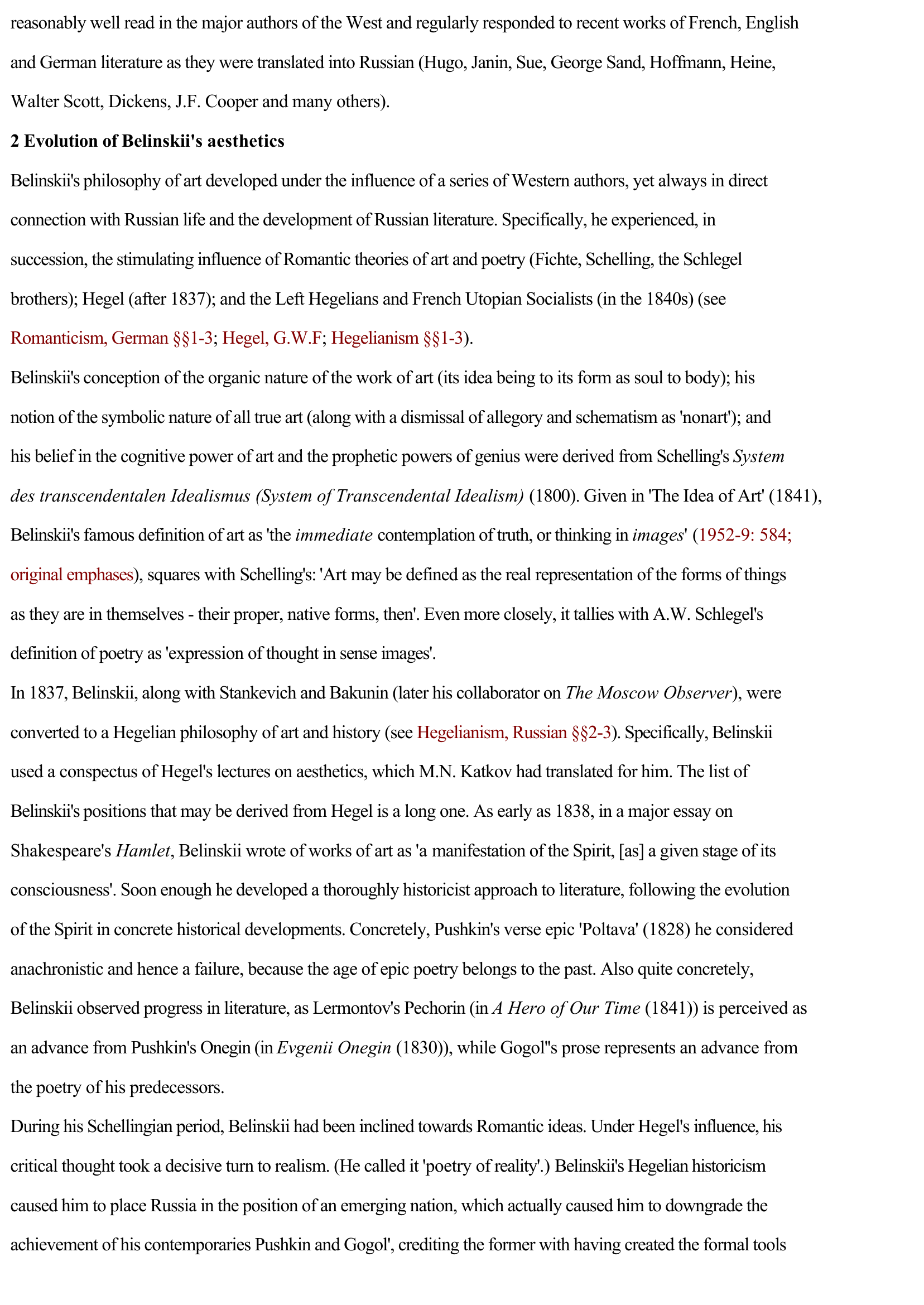Belinskii, Vissarion Grigorievich
Publié le 22/02/2012

Extrait du document
«
reasonably well read in the major authors of the West and regularly responded to recent works of French, English
and German literature as they were translated into Russian (Hugo, Janin, Sue, George Sand, Hoffmann, Heine,
Walter Scott, Dickens, J.F.
Cooper and many others).
2 Evolution of Belinskii's aesthetics
Belinskii's philosophy of art developed under the influence of a series of Western authors, yet always in direct
connection with Russian life and the development of Russian literature.
Specifically, he experienced, in
succession, the stimulating influence of Romantic theories of art and poetry (Fichte, Schelling, the Schlegel
brothers); Hegel (after 1837); and the Left Hegelians and French Utopian Socialists (in the 1840s) (see
Romanticism, German §§1-3 ; Hegel, G.W.F ; Hegelianism §§1-3 ).
Belinskii's conception of the organic nature of the work of art (its idea being to its form as soul to body); his
notion of the symbolic nature of all true art (along with a dismissal of allegory and schematism as 'nonart' ); and
his belief in the cognitive power of art and the prophetic powers of genius were derived from Schelling's System
des transcendentalen Idealismus (System of Transcendental Idealism) (1800).
Given in 'The Idea of Art' (1841),
Belinskii's famous definition of art as 'the immediate contemplation of truth, or thinking in images ' (1952-9: 584;
original emphases ), squares with Schelling's : 'Art may be defined as the real representation of the forms of things
as they are in themselves - their proper, native forms, then' .
Even more closely, it tallies with A.W.
Schlegel's
definition of poetry as 'expression of thought in sense images' .
In 1837, Belinskii, along with Stankevich and Bakunin (later his collaborator on The Moscow Observer ), were
converted to a Hegelian philosophy of art and history (see Hegelianism, Russian §§2-3 ).
Specifically, Belinskii
used a conspectus of Hegel's lectures on aesthetics, which M.N.
Katkov had translated for him.
The list of
Belinskii's positions that may be derived from Hegel is a long one.
As early as 1838, in a major essay on
Shakespeare's Hamlet , Belinskii wrote of works of art as 'a manifestation of the Spirit, [as] a given stage of its
consciousness' .
Soon enough he developed a thoroughly historicist approach to literature, following the evolution
of the Spirit in concrete historical developments.
Concretely, Pushkin's verse epic 'Poltava' (1828) he considered
anachronistic and hence a failure, because the age of epic poetry belongs to the past.
Also quite concretely,
Belinskii observed progress in literature, as Lermontov's Pechorin (in A Hero of Our Time (1841)) is perceived as
an advance from Pushkin's Onegin (in Evgenii Onegin (1830)), while Gogol''s prose represents an advance from
the poetry of his predecessors.
During his Schellingian period, Belinskii had been inclined towards Romantic ideas.
Under Hegel's influence, his
critical thought took a decisive turn to realism.
(He called it 'poetry of reality' .) Belinskii's Hegelian historicism
caused him to place Russia in the position of an emerging nation, which actually caused him to downgrade the
achievement of his contemporaries Pushkin and Gogol' , crediting the former with having created the formal tools.
»
↓↓↓ APERÇU DU DOCUMENT ↓↓↓
Liens utiles
- RÊVERIES LITTÉRAIRES Vissarion Grigoriévitch Bélinsky
- Bielinski ou Belinski Vissarion Grigorievitch, 1811-1848, né à Sveaborg, historien de la littérature et critique russe.
- Belinski, Vissarion - écrivain.
- Belinski, Vissarion - littérature.
- Bielinski ou Belinski (Vissarion Grigorievitch Journaliste et critique littéraire russe (Sveaborg, près d'Helsinki, 1811 - Saint-Pétersbourg, 1848).

































